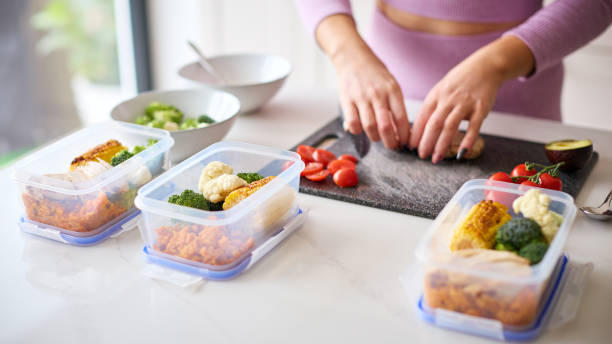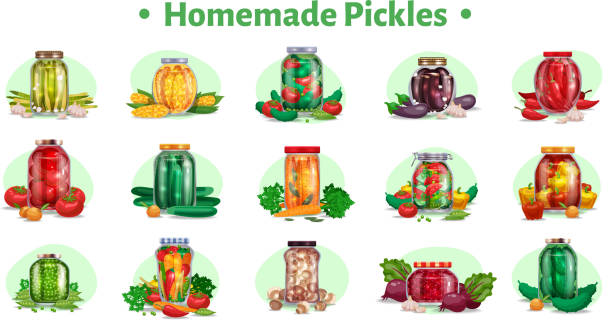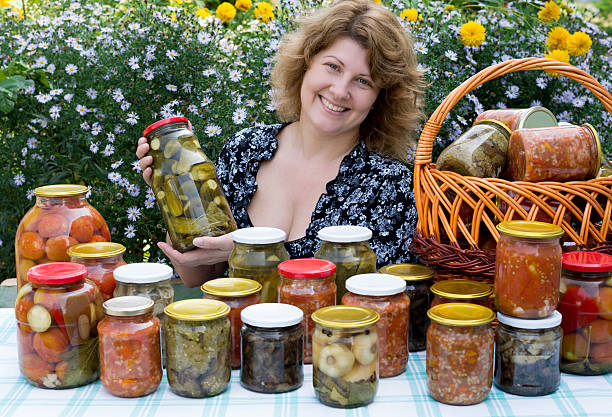The aroma of dill and vinegar, the satisfying crunch of a perfectly preserved cucumber—there’s something special about homemade pickles. The market for artisanal, locally made foods is booming, and starting a small food business from your kitchen has never been more accessible. If you’ve got a killer family recipe or a passion for pickling, you might be sitting on a delicious business idea.
This guide will walk you through everything you need to know about how to start a small homemade pickles business from home. We’ll cover everything from navigating legal requirements to marketing your unique creations. By the end, you’ll have a clear roadmap to turn your passion project into a profitable venture.
First, Do Your Market Research
Before you buy a single cucumber, it’s crucial to understand the market. A little research now will save you a lot of guesswork later.
Identify Your Niche and Audience
Who are you selling to? Your target audience could be anyone from health-conscious foodies looking for organic, probiotic-rich snacks to families wanting flavorful additions to their meals. Perhaps you’ll target gift-givers with beautifully packaged pickle sets or local restaurants seeking unique ingredients. Defining your audience helps you tailor your products, branding, and marketing efforts.
Analyze the Competition
Take a look at who else is selling pickles in your area.
- Major Brands: Big names like Claussen and Vlasic are your indirect competitors. You can’t compete on price, but you can win on quality, unique flavors, and the story behind your brand.
- Artisan Brands: Look at other small-batch pickle makers, like the family-run McClure’s Pickles or the innovative Brooklyn Brine. What makes them successful? Notice their branding, flavor profiles, and price points. Your unique selling proposition (USP) will be key to standing out.
- Farmers’ Market Vendors: If you plan to sell at local markets, see what other vendors are offering. You can differentiate by offering online ordering for those who can’t make it to the market.
Develop Your Unique Selling Proposition (USP)
What makes your pickles special? This is the heart of your brand. Your USP could be:
- Family recipes passed down through generations.
- Unique flavor combinations inspired by global cuisine.
- Using only locally sourced, organic ingredients.
- Offering customizable spice levels.
- Focusing on health benefits, like probiotics from natural fermentation.
- Sustainable packaging and business practices.
Your USP is your story—tell it proudly!
Navigate Legal Requirements and Permits

This is the most critical step and the one that often intimidates new entrepreneurs. Don’t skip it. Operating legally protects you and your customers.
Disclaimer: Starting a food business involves legal and safety requirements. This blog provides general guidance, but you must consult your local and state regulations and professionals to ensure full compliance. The author and publisher are not liable for any losses or damages related to the use of this information. Food safety is your responsibility.
Cottage Food Laws
Most states have “cottage food” laws that allow you to produce certain low-risk foods (like pickles) in your home kitchen without needing a commercial license. These laws vary significantly by state. Research your specific state’s cottage food laws to understand the rules on sales limits, approved products, and labeling. The National Center for Home Food Preservation is an excellent resource.
Permits and Licenses
Even under cottage food laws, you’ll likely need:
- Business License: Register your business with your city or county.
- Food Handler’s Permit: You and anyone helping you will likely need to complete a food safety course.
- Zoning Approval: Check if your residential area permits home-based businesses.
Labeling and Safety
Proper labeling isn’t just a good idea; it’s the law. Your labels must typically include:
- Your business name and address.
- The product name.
- A complete list of ingredients, in descending order by weight.
- Net weight of the product.
- Allergen warnings.
- A statement like “Made in a home kitchen” if required by your cottage food law.
You should also consider creating a food safety plan based on HACCP (Hazard Analysis and Critical Control Points) principles to ensure your pickling process is safe. Finally, get liability insurance to protect your small business from potential claims.
Source Your Ingredients and Equipment
The quality of your pickles depends entirely on the quality of your ingredients.
- Ingredients: Find reliable suppliers for fresh cucumbers, high-quality vinegar, and spices. Partnering with local farms can be a great selling point and support your community. Consider offering seasonal varieties based on what produce is available.
- Equipment: You don’t need a factory to start. Essential equipment for a small-batch pickles business includes large stock pots, canning jars with new lids, funnels, ladles, and basic kitchen utensils.
Perfect Your Recipes
This is the fun part! Start with a few solid recipes you know and love. Classic varieties are always a great starting point:
- Classic Dill Pickles: A timeless favorite with garlic and dill.
- Bread and Butter Pickles: A sweet and tangy option perfect for sandwiches.
- Spicy Jalapeño Pickles: For customers who like a little heat.
Once you’ve mastered the basics, experiment with unique flavors. Think about adding herbs like rosemary, spices like turmeric, or even fruit to create your signature pickle. Pay close attention to achieving the perfect crunch—nobody likes a soggy pickle! Keep detailed notes on every batch to ensure consistency.
Set Up Your Home Kitchen

Your kitchen is now your production facility. It needs to be clean, organized, and compliant with health standards.
- Sanitation: Thoroughly clean and sanitize all surfaces, equipment, and jars before you begin.
- Organization: Designate specific areas for ingredient prep, cooking, and cooling to create an efficient workflow.
- Storage: Follow proper food storage procedures. Store fresh ingredients correctly and keep finished products in a cool, dark place. Be prepared for a potential home inspection from your local health department.
Brand and Package Your Pickles
Your branding and packaging are the first things a customer sees. They should reflect the quality of what’s inside the jar.
- Brand Name and Logo: Choose a name that is memorable and tells your brand’s story. Design a simple, attractive logo that will look good on a label.
- Labels: Your labels should be appealing and easy to read. Include your logo, the pickle variety, and all legally required information.
- Packaging: Mason jars are a classic and affordable choice. You could also explore eco-friendly glass jars or unique ceramic crocks for a premium feel. Consider creating gift sets with multiple varieties for holidays and special occasions.
Create Your Pricing Strategy
Pricing can be tricky. You need to cover your costs, make a profit, and offer a price that customers are willing to pay.
- Cost-Plus Pricing: Calculate all your costs—ingredients, jars, labels, utilities, and your time. Add a markup (e.g., 50-100%) to set your price. This ensures you’re profitable.
- Value-Based Pricing: Price your pickles based on their perceived value. If you use organic, locally sourced ingredients and have unique, handcrafted recipes, you can charge a premium.
- Competitive Pricing: See what similar artisan brands are charging and position your prices accordingly. Don’t try to be the cheapest; compete on quality.
Market and Sell Your Product

You’ve made the pickles, now you need to sell them!
- Online Presence: Set up a simple website using a platform like Shopify or Etsy. Use social media like Instagram and Facebook to share high-quality photos of your pickles, behind-the-scenes content, and customer testimonials.
- Local Markets: Farmers’ markets, food festivals, and craft fairs are fantastic places to sell directly to customers. Offer samples—once people taste your pickles, they’ll be hooked.
- Collaborations: Partner with local delis, cafes, and specialty food stores to get your pickles on their shelves. This can greatly expand your reach. Successful brands like Rick’s Picks grew from small operations to nationally recognized names through smart partnerships.
- Content Marketing: Start a blog or email newsletter to share recipes, pickling tips, and news about your business. This builds a community around your brand.
Offer Excellent Customer Service
As a small business, you have an advantage: you can connect with your customers personally.
- Build Loyalty: Respond to comments and messages promptly. Thank customers for their purchases.
- Collect Feedback: Actively ask for reviews and listen to what your customers are saying. Use their feedback to improve your recipes and business practices. A happy customer is your best marketing tool.
Scale Your Homemade Pickles Business

Once your business is running smoothly, you might start thinking about growth.
- Expand Production: If demand outgrows your kitchen’s capacity, you might explore renting a commercial kitchen space.
- Hire Help: Don’t be afraid to hire employees to help with production, sales, or marketing.
- Widen Distribution: Look into wholesale distribution to get your products into more stores or consider shipping nationally if you comply with federal FDA regulations. The worker-owned cooperative Real Pickles is a great example of a business that scaled while staying true to its ethical mission.
Your Next Steps
Starting a homemade pickles business from home is a journey that combines culinary passion with entrepreneurial spirit. It requires careful planning, adherence to legal standards, and a lot of hard work, but the reward of seeing customers enjoy something you created is immense.
Take the first step today. Start researching your local cottage food laws, perfecting that secret family recipe, and dreaming up your brand. The world is ready for your delicious pickles.
Have you ever considered starting a homemade food business? What challenges do you foresee? Share your thoughts in the comments below!
FAQ How to Start a Homemade Pickles Business From Home
Is a homemade pickle business profitable?
Yes, it can be very profitable. Profit margins depend on your ingredient costs, pricing strategy, and sales volume. By focusing on a premium, artisan product, you can command higher prices and build a successful small business.
Do I need a commercial kitchen to start a pickle business?
Not necessarily. Many states’ cottage food laws allow you to produce and sell pickles made in your home kitchen, provided you meet certain safety and labeling requirements. Always check your local regulations.
What are the biggest challenges when starting a cottage food business?
The biggest challenges often involve navigating the legal requirements, ensuring consistent product quality, and finding effective ways to market and sell your products. This guide provides a solid framework for tackling these hurdles.
How do I make my pickles stand out from major brands?
Differentiate your homemade pickles by focusing on what big brands can’t offer: small-batch quality, unique and bold flavors, locally sourced ingredients, a compelling brand story, and direct connection with your customers.
